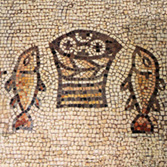 |
| Home | CBCEW | Search |
Year of the Eucharist

 |
Resources
| Spirit of the Season |
| Recent Additions |
Homily of John Paul II
preached during the Mass for the Solemnity of the Body and Blood of Christ at the Basilica of St. John Lateran. June 10, 2004
1. ‘For as often as you eat this bread and drink the cup, you proclaim the Lord's death until he comes" (1 Corinthians 11:26).
With these words St. Paul reminds the Christians of Corinth that the ‘Lord's supper’ is not only a convivial gathering, but also -- and above all — the memorial of the redeeming sacrifice of Christ. Whoever takes part -- the Apostle explains -- unites himself to the mystery of the death of the Lord, in fact, becomes his ‘herald.’
There is, therefore, a very close relation between ‘celebrating the Eucharist’ and proclaiming Christ. To enter into communion with him in the Pasch memorial means, at the same time, to become missionaries of the event that the ritual realizes. In a certain sense, it means to render it contemporary at all times, until the Lord returns.
2. Dear brothers and sisters, let us relive this wonderful reality of today's solemnity of Corpus Domini, in which the Church not only celebrates the Eucharist, but carries it solemnly in procession, proclaiming publicly that the sacrifice of Christ is for the salvation of the whole world.
Grateful for this immense gift, the Church draws close to the Most Holy Sacrament because it is the source and summit of our being and action. ‘Ecclesia de Eucharistia vivit!’ The Church lives from the Eucharist and knows that this truth does not only express a daily experience of faith, but encloses in a synthetic manner the nucleus of the mystery that she herself is (see encyclical letter Ecclesia de Eucharistia, 1).
3. Ever since, with Pentecost, the People of the New Covenant "began their pilgrim journey toward the heavenly homeland, the Divine Sacrament has continued to articulate their days, filling them with confident hope" (ibid.). Thinking specifically about this, I wished to dedicate to the Eucharist the first encyclical of the new millennium and I am now happy to announce a special Year of the Eucharist. It will begin with the World Eucharistic Congress, planned from October 10-17 in Guadalajara (Mexico), and will end with the next ordinary assembly of the Synod of Bishops, which will be held in the Vatican from October 2-29, 2005, and whose theme will be "The Eucharist: Source and Summit of the Life and Mission of the Church."
Through the Eucharist, the ecclesial community is built as a new Jerusalem, principle of unity in Christ between different peoples and nations.
4. ‘You give them something to eat’ (Luke 9:13).
The Gospel page we heard a short while ago gives an effective image of the profound connection existing between the Eucharist and this universal mission of the Church. Christ, "the living bread which came down from heaven" (John 6:51; see Gospel Acclamation), is the only one who can satisfy man's hunger at all times and in all parts of the earth.
However, he does not want to do it alone and so, as in the multiplication of the loaves, involves the disciples: "And taking the five loaves and the two fish he looked up to heaven, and blessed and broke them, and gave them to the disciples to set before the crowd" (Luke 9:16). This miraculous sign is a figure of the greater mystery of love that is renewed every day in the holy Mass: Through the ordained ministers, Christ gives his Body and Blood for the life of humanity. And all those who nourish themselves worthily at his table, become living instruments of his presence of love, mercy and peace.
5. ‘Lauda, Sion, Salvatorem! – Sion, praise the Saviour, your guide and shepherd, with hymns and canticles.’
With profound emotion we feel this invitation to praise and joy resound in our hearts. At the end of the holy Mass we will carry the Divine Sacrament in procession to the Basilica of St. Mary Major. Contemplating Mary, we will understand better the transforming force that the Eucharist possesses. Listening to her, we will find in the Eucharistic mystery the courage and strength to follow Christ the Good Shepherd and to serve him in our brothers.
[Translation by ZENIT]
|
© CBCEW
|
Home | CBCEW | Search |